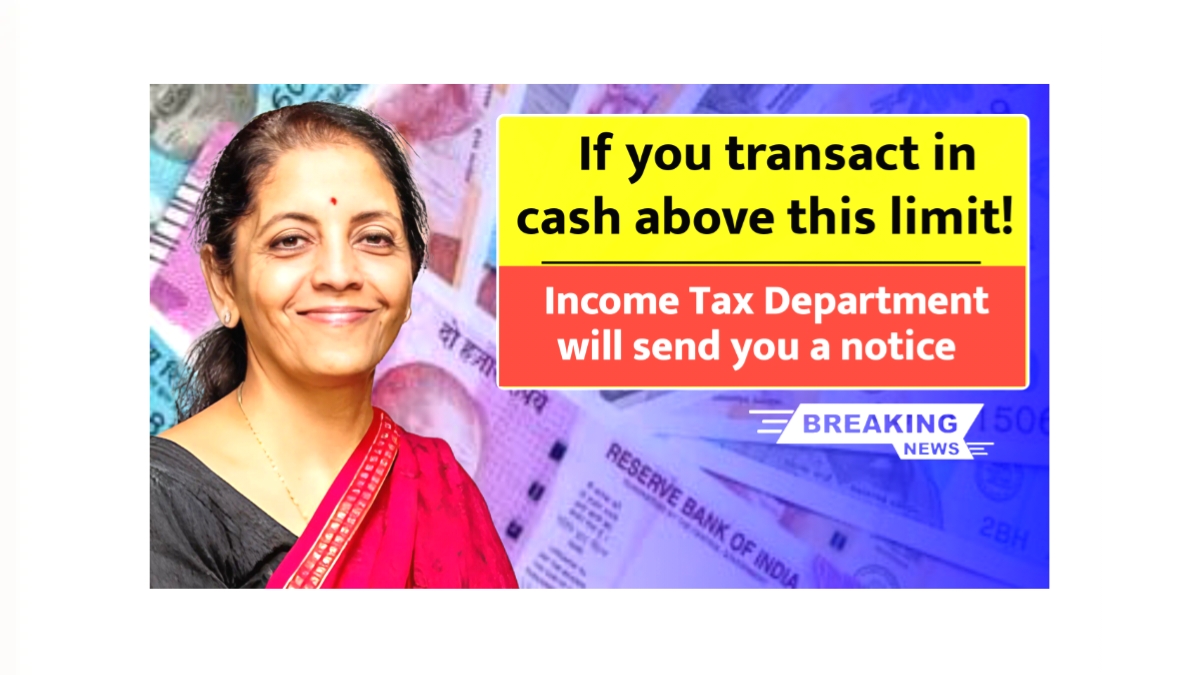Income Tax Rule: In today’s digital era, many individuals still prefer cash transactions for convenience or personal preference. However, the Indian government continues to promote digital payments and has placed strict restrictions on large cash dealings. To enforce compliance, the Income Tax Department has introduced specific rules, and any violation of these can result in hefty penalties and legal consequences.
Daily Cash Transaction Limit Set at ₹2 Lakh
As per current regulations, the maximum cash transaction allowed in a single day is ₹2 lakh. Any individual conducting cash transactions above this limit may receive a notice from the Income Tax Department. The rule applies to both individuals and business entities. Transactions beyond this limit are considered suspicious and may lead to scrutiny, financial penalties, and even criminal investigation in certain cases.
Exemptions for Banks and Government Institutions
The rule does allow for certain exceptions. Banks, post offices, and specific government bodies are permitted to handle transactions above the ₹2 lakh limit. These institutions follow a separate set of guidelines. However, this exemption does not apply to individuals or businesses engaged in regular cash dealings. For them, the ₹2 lakh cap is strictly enforced and monitored.
Relevant Sections Under Income Tax Law
Various sections of the Income Tax Act govern cash transactions. Section 40A(3) and Section 43 deal with cash payments made in business contexts. Section 269SS and Section 269ST prohibit receiving cash above prescribed limits. Section 269T relates to cash repayment of loans and fixed deposits. These legal provisions have been established to curb black money and promote accountability in financial practices.
Income Tax Department’s Monitoring Mechanism
The Income Tax Department now maintains close surveillance on high-value cash transactions. Financial institutions are required to report such transactions to the department regularly. With the help of real-time data analytics, any out-of-pattern transaction can trigger an alert. This system helps in identifying potential tax evasion and prompts the issuance of a notice demanding a valid explanation from the individual concerned.
Preferred Alternatives for Large Transactions
For transactions exceeding the ₹2 lakh limit, the department advises using formal banking channels. Digital options such as NEFT, RTGS, IMPS, and UPI are considered safe and compliant with current tax laws. These methods ensure transparency and provide a traceable record. Additionally, they reduce the risk of loss or fraud associated with handling large sums of physical cash.
Consequences of Violating Cash Transaction Rules
Failure to adhere to cash transaction limits can lead to severe consequences. The penalty may be equivalent to the amount transacted in violation. For instance, a cash transaction of ₹2.5 lakh may incur a penalty of the same amount. The department may also initiate a detailed investigation into the person’s income sources, possibly uncovering other irregularities, which could escalate legal troubles.
Best Practices to Avoid Income Tax Notices
It is advisable to conduct all high-value transactions through your bank account to avoid penalties or tax scrutiny. Maintaining proper financial records, using digital payment tools, and staying informed about the latest Income Tax regulations can safeguard individuals from future complications. Periodic reviews of personal and business transactions also help in identifying potential compliance gaps.
Government’s Push Towards a Transparent Economy
These measures are part of the government’s broader initiative to formalize the economy and discourage the use of unaccounted cash. Increasing reliance on digital payments not only ensures better compliance but also boosts financial inclusion. By following the rules set by the Income Tax Department, individuals contribute to a more transparent and accountable financial system.
Disclaimer
This article is for informational purposes only. Please consult the official website of the Income Tax Department or a certified financial advisor before making any financial decisions.
